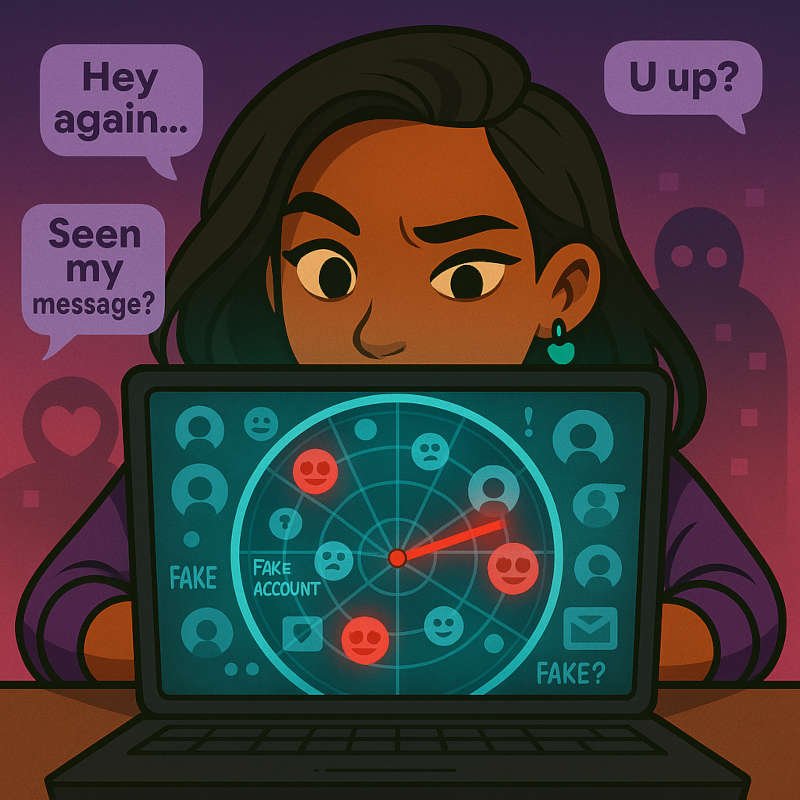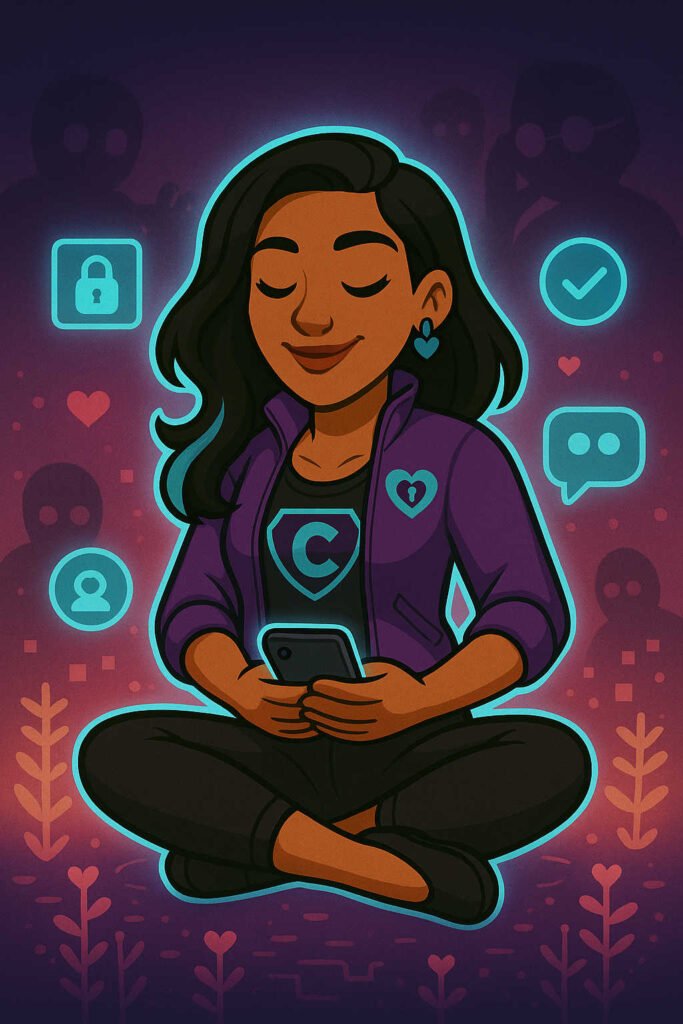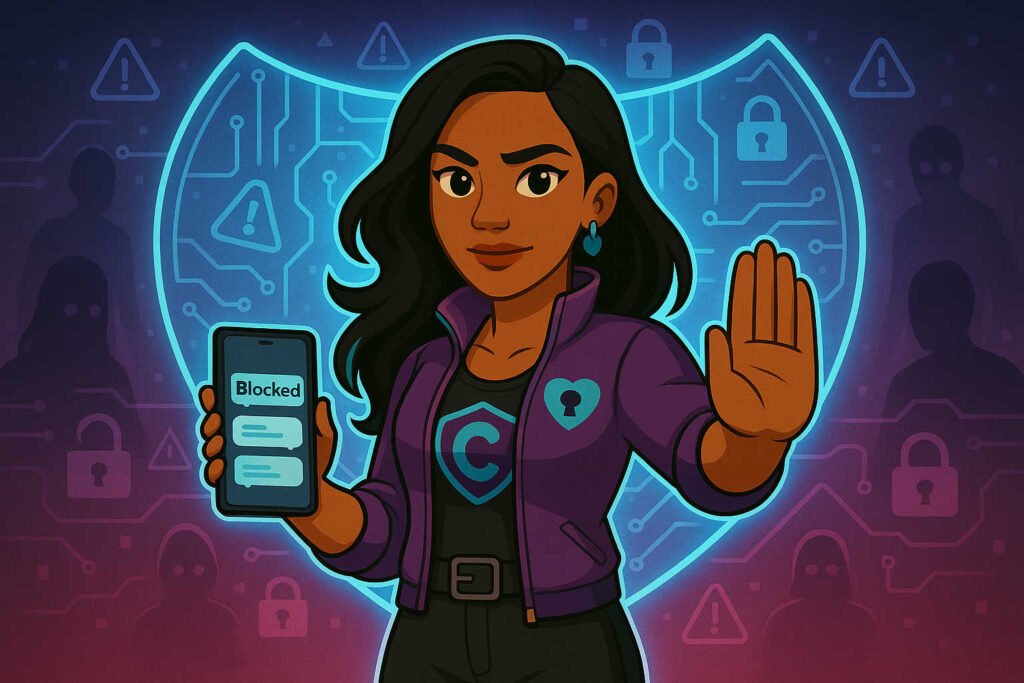💬 Tagline:
If someone’s giving you that icky feeling online… you’re not imagining it.
Table of Contents
- Why This Matters: Creepers Are Real
- What Online Stalking Actually Looks Like
- Red Flags: Signs Someone’s Crossing the Line
- How to Protect Yourself (Without Going Off the Grid)
- What to Do If It’s Happening to You
- Real Talk: It’s Not Your Fault
- Quick FAQs
- Glossary of Terms
- Cysecsis Final Word: You Deserve Digital Peace
💡 1. Why This Matters: Creepers Are Real
It’s not just paranoia. It’s not “being dramatic.”
Online stalking is real, and it’s way more common than people think—especially for women, femmes, and marginalized folks.
🌐 1 in 4 young women say they’ve experienced persistent unwanted contact online.
Yet most of us have been told to “just ignore it” or “take it as a compliment.” 🙄
Here’s the truth:
You deserve to feel safe and in control of your online space.
This guide will help you spot red flags, shut down creepers, and reclaim your peace of mind—with no shame, and no tech jargon.
👀 2. What Online Stalking Actually Looks Like
Online stalking isn’t always dramatic. It often starts as “just checking in” or “being persistent” and slowly builds.
It can look like:
- Flooding your DMs or comments, even after being ignored
- Watching everything you post, reacting to old stories/photos
- Creating fake accounts to watch you if blocked
- Digging into your old posts, friends, or tagged photos
- Showing up on different platforms unexpectedly
🧠 Rule of thumb:
If it makes you uncomfortable, it’s a red flag—even if they say they’re “just being nice.”
🚩 3. Red Flags: Signs Someone’s Crossing the Line
💬 They Won’t Take a Hint
You ignore them, they keep messaging. You ask them to stop, they come back later. They act entitled to your attention.
🔎 They Know Too Much
They reference things you didn’t tell them—maybe something you posted weeks ago, or a friend they found through your tags.
🧱 They Try to Control How You Post
They comment like:
– “Who’s that guy in your pic?”
– “You used to post more.”
– “Why didn’t you answer me?”
🔁 They Keep Popping Up
You block them—they come back on a new account. Or worse, they follow your friends and start interacting there.

🛡️ 4. How to Protect Yourself (Without Going Off the Grid)
🔒 1. Lock Down Your Privacy Settings
- Limit who can message, tag, or friend you
- Make your past posts visible to “Friends Only”
- Turn off location sharing on photos and posts
🧩 2. Keep Personal Details Off Public Profiles
Don’t post:
- School or workplace info
- Real-time location (wait before tagging!)
- Contact info like emails or alt accounts
🗂️ 3. Separate Your Spaces
Use a private account for friends and a public one for content creation. Stalkers often target creators who seem accessible.
🔐 4. Use 2FA (Two-Factor Authentication)
This helps prevent stalkers from trying to log in or mess with your accounts.
💥 5. What to Do If It’s Happening to You
📸 1. Save the Receipts
Take screenshots. Save messages. Document behavior—even if it seems small now. It builds a case.
🛑 2. Block and Report
Block them. Report them to the platform. If they come back, report again. Platforms are required to take this seriously.
💬 3. Talk to Someone
You don’t have to deal with this alone. Talk to:
- A trusted friend
- A school counselor or support worker
- Local digital safety support groups
🚓 4. Consider Reporting to Authorities
If you feel threatened or unsafe, file a police report. Online stalking can be a crime, depending on your country.
Important: If you’re under 18, tell a trusted adult now. You’re not overreacting. You’re being smart.
❤️ 6. Real Talk: It’s Not Your Fault
If someone won’t respect your space, it’s not because you “led them on.”
It’s because they chose not to respect your boundaries. End of story.
You have the right to:
- Say no
- Block someone
- Change your mind
- Exist online without being watched, chased, or analyzed
You are not “mean” for protecting your peace.
🙋♀️ 7. Quick FAQs
Q: What if they’re someone I know IRL?
That makes it harder, but boundaries still matter. Save proof. Tell someone you trust.
Q: Am I being “too sensitive”?
Nope. Your gut matters. If something feels off, it probably is.
Q: Can a stalker find my address or real identity?
If you’ve shared it online, possibly. Be cautious with things like landmarks, license plates, or full names.
Q: What’s the difference between liking someone and stalking them?
Simple: respect and space. If someone ignores you, stop messaging. Affection ≠ obsession.
📚 8. Glossary of Terms
- Online Stalking – Repeated, unwanted contact or observation through digital platforms
- 2FA (Two-Factor Authentication) – Extra login security, usually a code sent to your device
- DMs – Direct Messages on social media
- Doxxing – Sharing someone’s private information online without consent
- Boundaries – The limits you set around what you’re comfortable with
💜 9. Cysecsis Final Word: You Deserve Digital Peace
Sis, listen.
You don’t owe anyone your time, your replies, or your peace of mind.
If someone keeps crossing your boundaries, you have every right to shut that down.
Being safe online isn’t about hiding—it’s about standing in your power, with tools and support around you. I’ve got you. We’ve got each other.
Stay smart. Stay seen. Stay safe. 💜
With love,
Cysecsis

